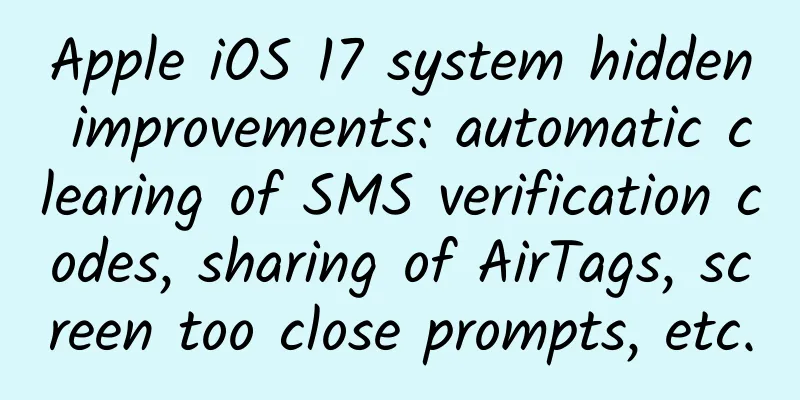Apple iOS 17 system hidden improvements: automatic clearing of SMS verification codes, sharing of AirTags, screen too close prompts, etc.

|
On June 6, at the WWDC 2023 developer conference in the early hours of this morning, Apple released the latest mobile operating system update iOS 17 as scheduled, but the improvements brought were not too many. It focused on optimizing details, with a focus on adjusting calls, messages, Facetime, lock screen interfaces, etc. IT Home found that iOS 17 has some hidden detail improvements that were not mentioned in the keynote speech. The following is a summary of the content: Automatically clear SMS verification codesIf your Messages app is often filled with one-time verification codes that need to be manually deleted, then iOS 17 has a new feature that will be very useful. The iOS 17 system update includes a new option to delete verification codes from Messages (and Mail) after they are inserted into an app or website via the AutoFill feature. Users can turn on "Auto-Clear" for verification codes in the Passwords app under "Password Options." Apple says that one-time codes sent to both Mail and Messages can be automatically deleted if the deletion feature is enabled. Improved prediction input methodApple says iOS 17 includes a state-of-the-art language model for word prediction that will greatly improve typing autocorrect on the iPhone. In addition, users will receive inline predictive text suggestions as they type, allowing them to add words or complete sentences by tapping the space bar. Apple says the system will also learn a user's typing habits over time and avoid some corrections. Share AirTagiOS 17 introduced a much-anticipated AirTag feature, the ability to share AirTags with others. Since its launch, AirTags could only be owned and used by one person, but with the iOS 17 update, that changed. In the Find My app, users can select an AirTag and select the “Share This AirTag” option to invite others. The invited people will be able to see the location of the AirTag, such as lending items with AirTags to friends or family to avoid false alarms. Lock Safari Private Browsing with Face IDApple is beefing up Safari’s security in iOS 17, with private browsing now requiring Face ID authentication or a passcode to access. If a user opens a private browsing window in Safari, they will need to authenticate using Face ID. This mode will completely block known trackers and all extensions will be turned off, but they can be turned on manually. Create your own voiceIn the first iOS 17 preview, Apple introduced a new accessibility feature called "Personal Voice", which allows users to use artificial intelligence to create a replica of their own voice, a bit like the custom voice of Xiaomi XiaoAi. Other improvementsAccording to the findings of IT Home colleagues, iOS 17 also added recommendations for cleaning up large files such as photos, children's safety resources, screen distance safety, etc. On an iPhone or iPad with Face ID, if the user turns on the "Screen Distance" option, they will receive a prompt that the screen is too close, which is suitable for reminding children to protect their eyes. |
<<: About 81% of iPhones are now running iOS 16
>>: Apple opens iOS 17, watchOS 10, and macOS Sonoma developer betas to all users for free
Recommend
Consumer Reports: Tesla ranks last in 2021 car reliability report
The electric car market is full of waves. First, ...
When I check the source code of a web page, it is all garbled, but the page displays normally. What's going on?
When I check the source code of a web page, it is...
Tips for creating a brand from 0 to 1!
If new consumer brands want to complete high-qual...
Is counting so difficult? The brain also has "limits" to understanding numbers
For numbers greater than 4, the activation of dig...
How to plan a live e-commerce event?
Live streaming began to explode in 2015, sparking...
Tutorial on Anxin's no-source store group: how do those stores with tens of thousands of visitors in WeChat Moments do it?
Tutorial on Anxin's no-source store group: ho...
Why do humans want to explore the moon?
The moon is the closest natural celestial body to...
Liu Xifang Victoria's Secret Gadgets Private Yoga Class
Liu Xifang's Victoria's Secret Gadgets Pr...
How does Casarte’s 3C strategy achieve its century-old brand dream by setting high-end standards with Chinese originality?
With the continuous improvement of product qualit...
How to attract fans through WeChat and how to attract fans through WeChat activities?
WeChat, a social software owned by Tencent, has b...
How to attract new users and increase growth?
Because there is no growth, growth is imminent! A...
4 memory usage issues game developers need to pay attention to
[[151106]] By Aditya Kulkarni From a sales perspe...
What are those "black spots" on Chinese cabbage that can't be washed off? Can you eat it?
As soon as winter comes, cabbage becomes a regula...
The latest short video transfer technology, all types of short videos can be used for film and television, Jianying + Pipi editing, Yi Media, cloud editing
The latest short video transfer technology, all t...
Drink more hot water when it's cold? Be careful! Exceeding this temperature may cause cancer
When the weather gets cold, you can’t live withou...









